He cautioned against the Church’s laxity in invading the media space with “good messages”, saying, the Church in the Eastern Africa region “should go ahead strongly into IT; that is the future, and if we are not strong with IT, if we do not feed the world with IT materials, the others will fill the gap and we shall be lost.”
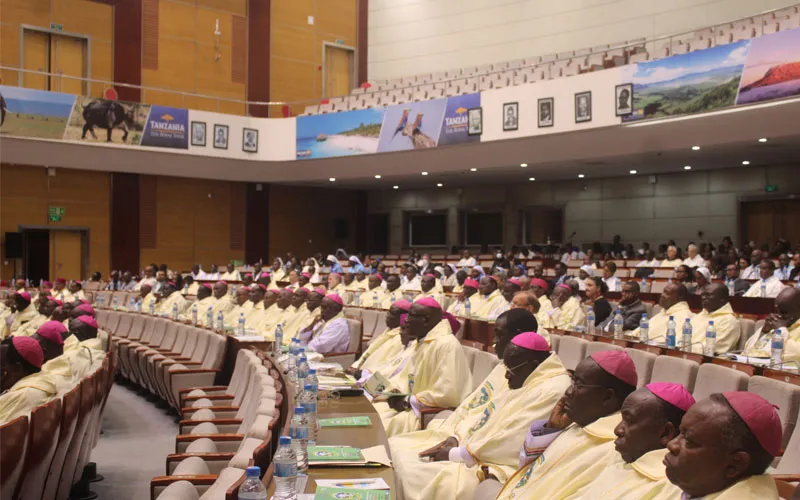 Delegates of the 20th Plenary Assembly of AMECEA in Dar es Salaam during the 11 July 2022 session. Credit: ACI Africa
Delegates of the 20th Plenary Assembly of AMECEA in Dar es Salaam during the 11 July 2022 session. Credit: ACI Africa
“Let the IT at AMECEA coordinate the national IT’s so that we can be able to bombard the media space with good messages,” the Tanzanian Catholic Bishop said.
He noted that through the Catholic University of Eastern Africa (CUEA), AMECEA had fulfilled its desire to have a regional Catholic University in the Eastern Africa region.
The Catholic Bishop said that though CUEA that is based in Nairobi, Kenya, is doing well, it is currently facing competition from Catholic universities that have sprung up in the AMECEA countries.
(Story continues below)
“CUEA is doing well but it needs to improve in certain areas,” Bishop Kilaini said, and explained, “At the moment, various countries in the region have started their own local Catholic universities. Not many people are sending students to CUEA, which has now become a university for Kenyan students where it is based.”
To set itself apart, CUEA needs to graduate to the level of center of excellence, the Auxiliary Bishop of Bukoba Diocese said.
“We encourage CUEA to make itself a Catholic hub of all the AMECEA countries. This way, it will be able to coordinate the other Catholic universities in the region to have a common vision, to promote a Catholic identity, ethical principles, Gospel values, social teachings of the Church, share intellectual resources, conduct joint research on key pastoral and theological and cultural issues. That is what CUEA should do because you can’t have these BA (Bachelor of Arts) students who have an option to study in their home countries,” he said.
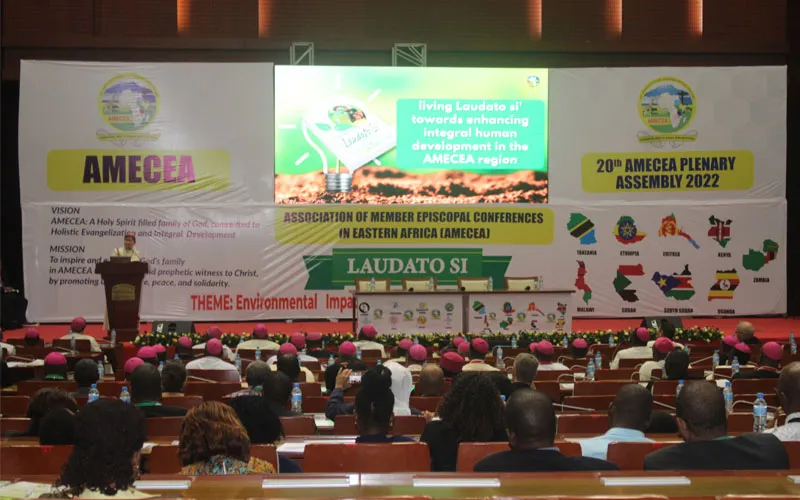 Delegates of the 20th Plenary Assembly of AMECEA in Dar es Salaam during the 11 July 2022 session. Credit: ACI Africa
Delegates of the 20th Plenary Assembly of AMECEA in Dar es Salaam during the 11 July 2022 session. Credit: ACI Africa
Bishop Kilaini who celebrated his golden jubilee since he was ordained a Priest in March noted that past AMECEA Plenary Assemblies had also dwelt hugely on justice and peace issues in the Eastern African region.
He said that there had been solidarity visits to many AMECEA countries that had been in turmoil, including South Sudan.
The Catholic Bishop called on AMECEA members to continue speaking out against injustices in their respective countries and in the region.
He said, “We should continue to be more vocal and the voice of the voiceless. Do not keep quiet when humanity is being hurt or is being abused. The Bishops should individually, and as Conferences, be able to speak up against injustices.”
He lauded Catholic Bishops in Eastern Africa for their solidarity since the inception of AMECEA, noting that the Bishops of the member countries regularly meet “even if it means just to know each other and to interact with one another”.
Agnes Aineah is a Kenyan journalist with a background in digital and newspaper reporting. She holds a Master of Arts in Digital Journalism from the Aga Khan University, Graduate School of Media and Communications and a Bachelor's Degree in Linguistics, Media and Communications from Kenya's Moi University. Agnes currently serves as a journalist for ACI Africa.
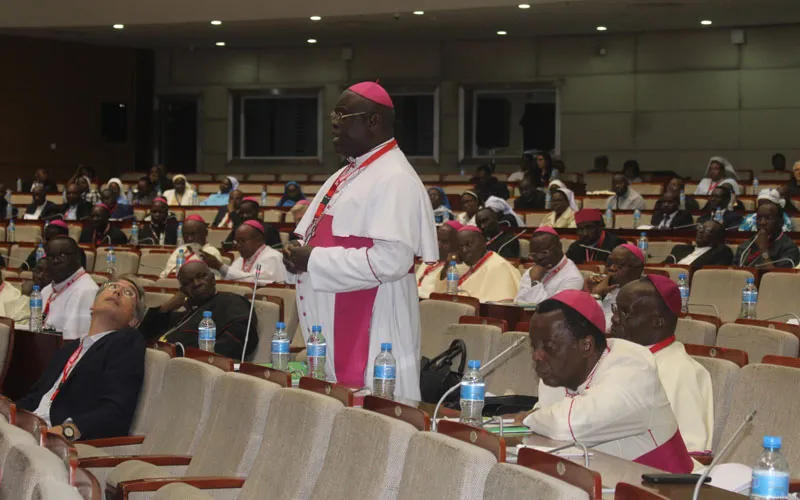 Delegates of the 20th Plenary Assembly of AMECEA in Dar es Salaam during the 11 July 2022 session. Credit: ACI Africa
Delegates of the 20th Plenary Assembly of AMECEA in Dar es Salaam during the 11 July 2022 session. Credit: ACI Africa


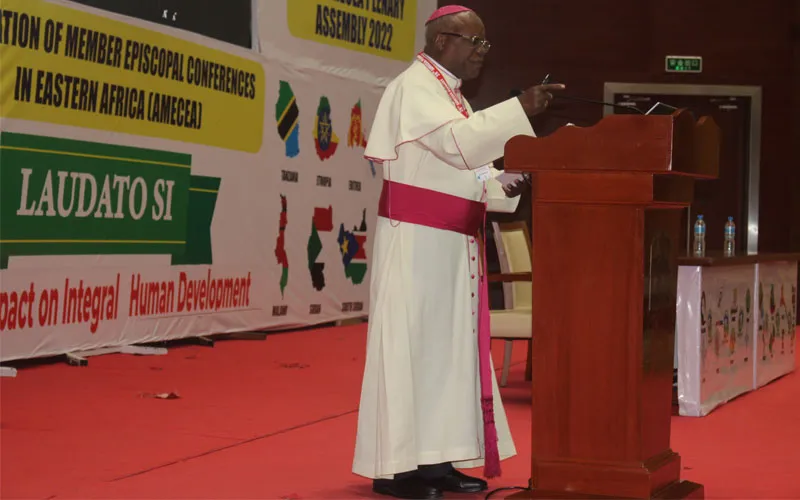
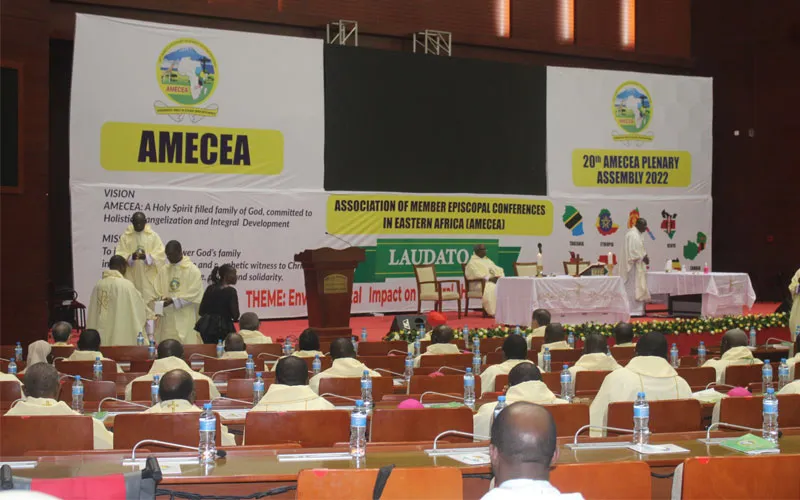 Delegates of the 20th Plenary Assembly of AMECEA in Dar es Salaam during the 11 July 2022 session. Credit: ACI Africa
Delegates of the 20th Plenary Assembly of AMECEA in Dar es Salaam during the 11 July 2022 session. Credit: ACI Africa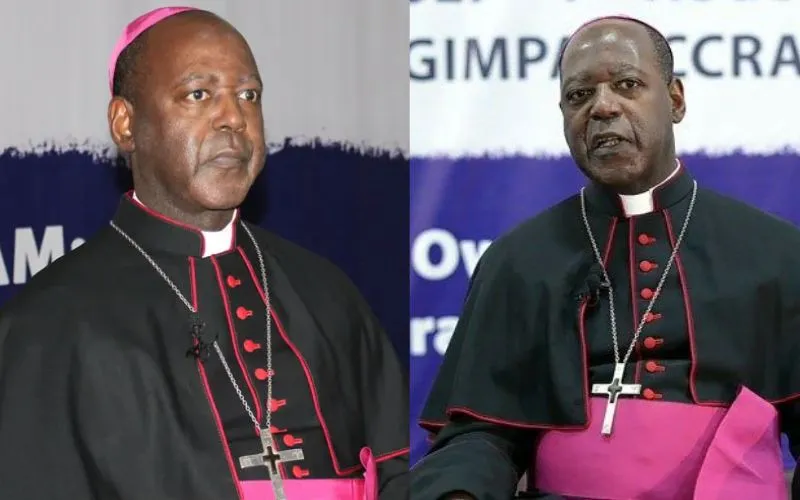
 Delegates of the 20th Plenary Assembly of AMECEA in Dar es Salaam during the 11 July 2022 session. Credit: ACI Africa
Delegates of the 20th Plenary Assembly of AMECEA in Dar es Salaam during the 11 July 2022 session. Credit: ACI Africa Delegates of the 20th Plenary Assembly of AMECEA in Dar es Salaam during the 11 July 2022 session. Credit: ACI Africa
Delegates of the 20th Plenary Assembly of AMECEA in Dar es Salaam during the 11 July 2022 session. Credit: ACI Africa


